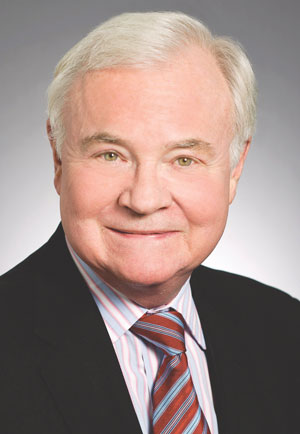Hospitals across the nation are doubling as succession and estate planning hubs, according to advisers in the field.

Clay Hudson, a partner at the Toronto office of Shibley Righton LLP, says clients are more likely to get down to the business of discussing the future of their assets and interests after a confrontation with their own mortality.
“A lot of people don’t want to think about death,” he says.
“It’s not part of their agenda, and they don’t want to deal with it. In our office, we have a lot of lawyers here doing wills for people, and they all tend to be people in crisis.
They wait until they’re quite sick until they do this.”
The situation is similar in Canadian family-operated businesses, according to Larry Klar of private equity firm Argosy Partners Ltd.
He’s managing partner of the succession fund, which invests in owner-operated companies to help them get through a transition in ownership or to plan for future succession.
Klar says clients are often seeking liquidity for a buyout of reluctant partners who want to exit the business for a variety of reasons. That includes long-time operators who have had enough or less active partners looking to cash out their shares.
“This can happen because someone is sick, tired, going through divorce or really any life-changing circumstance that affects their need for liquidity, which inevitably is going to affect the business,” says Klar.
He says that kind of reactive succession planning is a recipe for intensified strife among family members with competing interests.
“Conflict is always going to arise when people have different agendas,” says Klar.
He prefers to get on board with a company long before crisis strikes in order to get owners thinking about how it will go on without them at some point in the future.
“The time to address succession planning requirements and objectives is when you don’t have to — when you’re healthy, not when you’re under the gun because you’re ill or a family member is ill,” he says.
The succession fund typically spends between $3 million and $8 million on a stake in companies that usually accounts for 35 to 50 per cent of the shares. The fund then puts together a board of directors to address strategic planning, leaving the existing owner to continue management of day-to-day operations.
“Succession planning takes discipline,” says Klar. “It’s a process, not just an event.”
Doing the work earlier doesn’t mean the key questions to ask a business owner will be any simpler. Klar says many business owners assume their children or another member of the family will take over. What they may not have done is made sure the intended heir actually wants to do the job and, more importantly, that they’re capable of doing it.
Other key issues include assessing whether customers are loyal to the company or to its principal and the level of nepotism in the business and its supply chain.
“Those are quite uncomfortable questions to ask yourself,” says Klar.
“We think in those, what you might call, cold terms. We’re thinking in terms of an investment proposition. The more families think like that, the more they give themselves options down the road. You’re not really helping your shareholders, your family members or your customers if you’re not thinking through these issues.”
Hudson says testators who face up to tough questions about their estate before their death will reduce the chance of a messy fight over it later.
“You see cases where the mother gets annoyed, gives the money to charities, and the kids contest the will,” he says. “If it’s a very wealthy family, the person controlling the wealth should sit down with the kids and take them through the whole thing so it’s not such a surprise when they die.”
One way for a testator to mitigate the sometimes-inevitable strife associated with the execution of a will is to make provisions for executor’s insurance.
Myron Neufeld of ERAssure, which covers the costs of defence and indemnity for damages arising out of errors occurring during the administration of an estate, says many testators and potential executors are unaware of the level of personal liability they face in the performance of their duties. With estates that involve real estate or significant investments, the risks of a wrong move can be extremely costly.
“They get a deer-in-the-headlights-kind of look when it’s explained to them the tremendous amount of effort and challenge in the role they have ahead, so it offers them a piece of mind,” Neufeld says.
He says it’s particularly difficult and risky for people who transition into the executor role having held a power of attorney late in the life because of the tighter restrictions involved with the new role.
“The average executor might do it once or twice in their lifetime, so there’s no chance to get good at this,” says Neufeld.
Lawyers also like the idea, according to Neufeld, who says it’s “like a second layer of errors-and-omissions insurance for them.”
“If, for some unforeseen reason the executor is challenged, usually what happens is the lawyer gets brought into the mix because they become the default expert in the process, regardless of whether they were involved in the decision-making or providing guidance,” he says.
“As part of the policy, we waive our right of subrogation against them. So if we defend, we waive our rights to chase the lawyers.”
To answer this week's poll question on this issue, see the Law Times
homepage.

 Clay Hudson, a partner at the Toronto office of Shibley Righton LLP, says clients are more likely to get down to the business of discussing the future of their assets and interests after a confrontation with their own mortality.
Clay Hudson, a partner at the Toronto office of Shibley Righton LLP, says clients are more likely to get down to the business of discussing the future of their assets and interests after a confrontation with their own mortality.